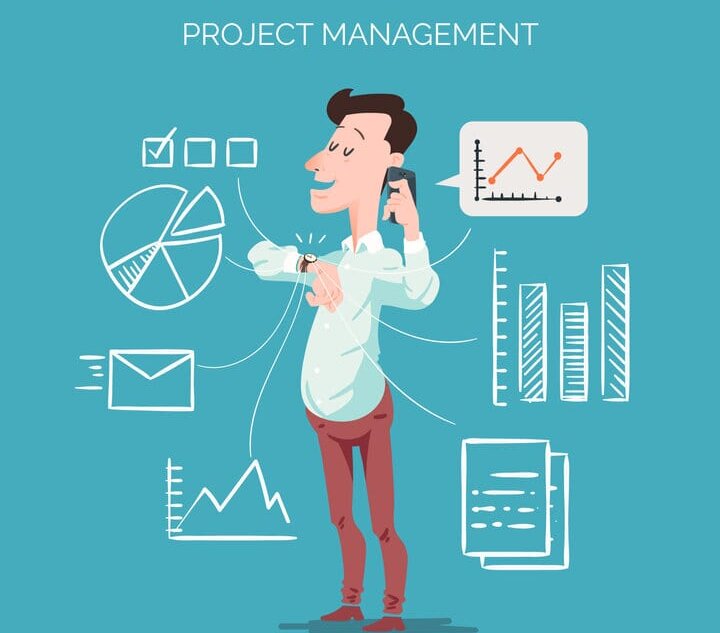Out of the many managerial careers out there, being a project manager can be lucrative. It’s a role that’s highly sought after in many industries, and the scope for good managers to advance their careers to other leadership roles is plenty. Data from the Bureau of Labor Statistics shows that by 2027, this is a career path that will see a 6% growth by 2032.
Considering a project management career? It’s a great choice, but understand the responsibilities and expectations involved. Project management can be overwhelming if you’re not prepared. This article explores some key challenges to know beforehand.
Let’s dive in.

Understanding the Roles and Responsibilities of a Project Manager
If you lack experience, now is a good time to upskill. Many of the skills needed to be a good project manager can be learned with an online master’s degree in operations management. Depending on the program, you are usually taught key concepts like project planning and life cycle, risk management, budgeting, scheduling, and more.
According to Kettering University, it’s a qualification that allows you to link people, performance, and workflow processes. These are your chief responsibilities.
If you work for a large tech company like Samsung or Apple, there are new releases happening every year. Depending on your experience and seniority, you will be doing market research and facilitating collaboration not just with one team but often across multiple ones.
Some companies choose to separate product managers from marketing responsibilities, but others won’t. In such cases, you will also need to create or coordinate a market strategy and sales plan. Yes, it can be a lot of work, especially when nearing a product launch.
That said, it can also be incredibly exciting if you are good at your job. You get to see your efforts pay off, and when things go right, you do get the recognition you deserve. People, both in upper management and your juniors, are aware of how much effort you are putting in, and you definitely get the spotlight if you do a stellar job.
Dealing With Unpredictability and Pressure Can Be Frustrating
When a team is great, you may sometimes wonder what the project manager even does. Is their role even required? Well, the truth is that even with a great team, unpredictability is a factor that will keep you on your toes. As a manager, the last thing you want is to deal with a crisis, so a lot of your effort goes into risk prevention more than management.
What people don’t tell you is the toll this takes on you because of how vigilant you always have to be. As Indeed.com points out, these risks can span from tech failures, scope creep, cost risk, and more. If you are someone who doesn’t like making tough decisions, you may have a tough time initially.
Decision fatigue is a common problem that many project managers talk about. Sometimes, having to constantly make decisions can also lead to problems. You are constantly aware of the fact that if something goes wrong, you are the one going to be held responsible. This ends up having another complex set of implications.
Mastering Team Dynamics and Leadership Will Be Critical
The key challenge in being responsible for a project is often team dynamics. How do you exert pressure and ensure quality is met while also not frustrating your team? It can feel like an impossible battle, and many project managers fold and stay on the side of upper management.
They feel that to be a good manager, they need to accept that the team might dislike or hate them. However, this doesn’t have to be the case. If you choose to work in this field, you will find that learning team dynamics and leadership will be extremely helpful.
For instance, a lot of resentment towards project managers occurs because not enough information and context is being shared. They simply apply pressure about a deadline and repeat it ad nauseam. Consider opening up communication and being more transparent.
Explain the stakes involved so that the team understands the bigger picture. Without context, team members end up feeling like the pressure is arbitrary. Similarly, you will want to build strong alliances both with your team and with upper management. This allows you to be a better advocate when friction arises.
Key Tips to Deal With the Demands as a Project Manager
We know that this role comes with challenges and isn’t always a walk in the park. So, how do you then deal with the situation and ensure that you aren’t overwhelmed? Well, here are some tips that can help.
Firstly, try not to fall into the mindset that the world will end if a mistake or problem occurs. You aren’t a superhero, and even the most demanding bosses secretly know when you did your best. Deadlines, as serious and scary as they seem, are negotiable more often than you think.
A lot of project managers simply never bother to ask or try to push for more realistic expectations. This is something you will start experimenting with with more experience.
Remember that unless you deliberately choose to derail a project, you aren’t going to get fired. If you lose your job out of a genuine mistake, then the company wasn’t worth the effort in the first place. Sometimes, all you need is the confidence to own the ‘It is what it is’ mindset.
To summarize, being a project manager is certainly no walk in the park. It is not a position that rewards timidity or those who like to avoid conflict. That said, if you have even a moderate amount of decisiveness, decent communication skills, and a streak of good leadership, you should be more than fine.


